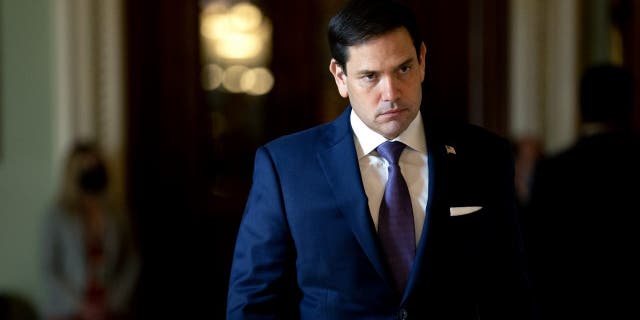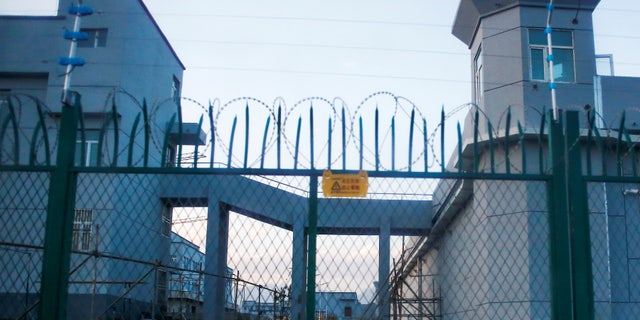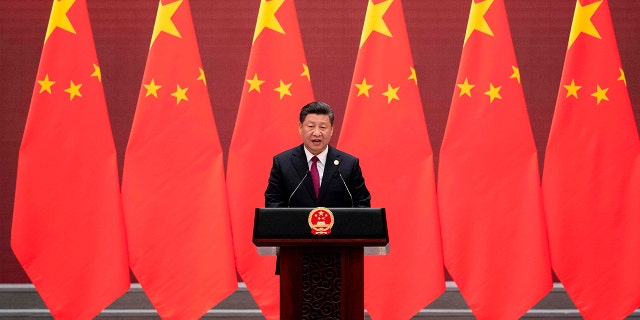Rubio demands answers from New York Times on Uyghur genocide 'cover-up'

WATCH: Sen. Marco Rubio calls out the New York Times for withholding documents on China
EXCLUSIVE: China hawk Sen. Marco Rubio, R-Fla., has demanded answers from The New York Times over the publication’s decision to withhold documents that directly linked Chinese President Xi Jinping to genocide against the Uyghur population.
In a Thursday letter, first obtained by Fox News, Rubio again requested the Times answer inquiries he first submitted last month that questioned its failure to release in full 403 pages of leaked documents – including a 2014 secret speech by Xi that ordered the rounding up of Uyghur populations.
Senator Marco Rubio, a Republican from Florida, walks to a Senate Republican caucus meeting at the U.S. Capitol in Washington, D.C.
(Photographer: Stefani Reynolds/Bloomberg via Getty Images)
“Critically important information was contained within the hundreds of pages that were hidden—and continue to be hidden—from the American people and governments across the globe,” Rubio wrote to The Times.
In 2019, The New York Times released a report that revealed Beijing’s quiet moves in setting up internment camps built to arbitrarily detain Muslim ethnic minorities.
But Rubio’s qualms with the publication is rooted in the report’s citation of Xi who described the events as an extension of tough counterterrorism laws purported by Beijing.
The senator also flagged The Times’ failure to detail the Chinese president’s orders that “those who should be seized should be seized, and those who should be sentenced should be sentenced.”
“To sit on this information that we know that they’ve had for at least two and a half to three years is really concerning, and it just tells you this is a selective release of information they possess,” Rubio told Fox News in a sit-down interview.
“My fear is, as damaging as this revelation has been to the Communist Party of China, after all this time there might be additional things in there that are damaging,” he continued. Adding he has questioned whether the documents “might even imply that our political leaders are aware of what has been happening there for some time and made arrangements not to discuss it.”
A perimeter fence is constructed around what is officially known as a vocational skills education centre in Dabancheng in Xinjiang Uighur Autonomous Region, China September 4, 2018. This centre, situated between regional capital Urumqi and tourist spot Turpan, is among the largest known ones, and was still undergoing extensive construction and expansion at the time the photo was taken. Police in Dabancheng detained two Reuters journalists for more than four hours after the photos were taken. Picture taken September 4, 2018. To match Special Report MUSLIMS-CAMPS/CHINA REUTERS/Thomas Peter
(REUTERS/Thomas Peter)
Rubio asked the paper to confirm whether anyone at the publication had been in communication with the Chinese Communist Party (CCP) regarding the leaked documents and whether this played a role in withholding aspects of information it possessed.
The Times’ assistant managing editor for international, Michael Slackman, responded to the senator’s November letter earlier this month and called Rubio’s characterization of its reporting “simply wrong.”
Slackman backed the publication’s decision not to publish the documents in full and cited concerns that Chinese authorities may be able to use forensic analysis to uncover the whistleblower.
But Rubio on Thursday pushed back on this after the Uyghur Tribunal announced it had received 317 pages of leaked documents that were an “identical subset of the Xinjiang Papers” first reported by The Times in 2019.
“Did the Times consider simply transcribing and making the full documents public or releasing the full documents to a select group of experts, as the Uyghur Tribunal has just done, given the importance of these documents, to assess and help stop an ongoing genocide?” the senator questioned.
“I would like to remind you that the New York Times is still withholding nearly 86 pages of critical documents that could inform the American people, policymakers, and business leaders of critical information surrounding Xi’s direct involvement in atrocities,” he added.
China’s President Xi Jinping gives a speech during the welcome banquet for leaders attending the Belt and Road Forum.
(NICOLAS ASFOURI/AFP via Getty Images)
Rubio said he suspects The Times may have withheld information for reasons other than source protection.
“Like any other corporate media entity they probably fear being kicked out of China, they probably fear losing access to China, losing reporting capabilities,” he told Fox News. “That comes into play for media outlets who decide not to pursue certain stories.”
Slackman said in his December response that The Times has already been “blocked on all platforms in mainland China” and that the “majority” of its correspondents were expelled from the country in 2020.
“The Times has continued to aggressively cover China’s repressive actions and policies, including the forced sterilization of Uyghur women, the labor programs to entrench control, the extensive propaganda campaign to deflect international attention, and the use of American technology by police in Xinjiang,” Slackman said.
CLICK HERE FOR THE FOX NEWS APP
But the senator also said he suspects politics could be at play.
“I think it’s ironic it happened during the Trump administration – an administration that built up a lot of its economic focus on evening the playing field with China,” Rubio said. “The New York Times was very critical of many of those decisions that Trump made regard to China.
“To put out there information that proves Xi Jinping is responsible for genocide would have helped the narrative being pursued by the Trump administration,” he added.
The New York Times could not immediately be reached by Fox News.
Source: Read Full Article




